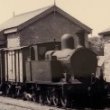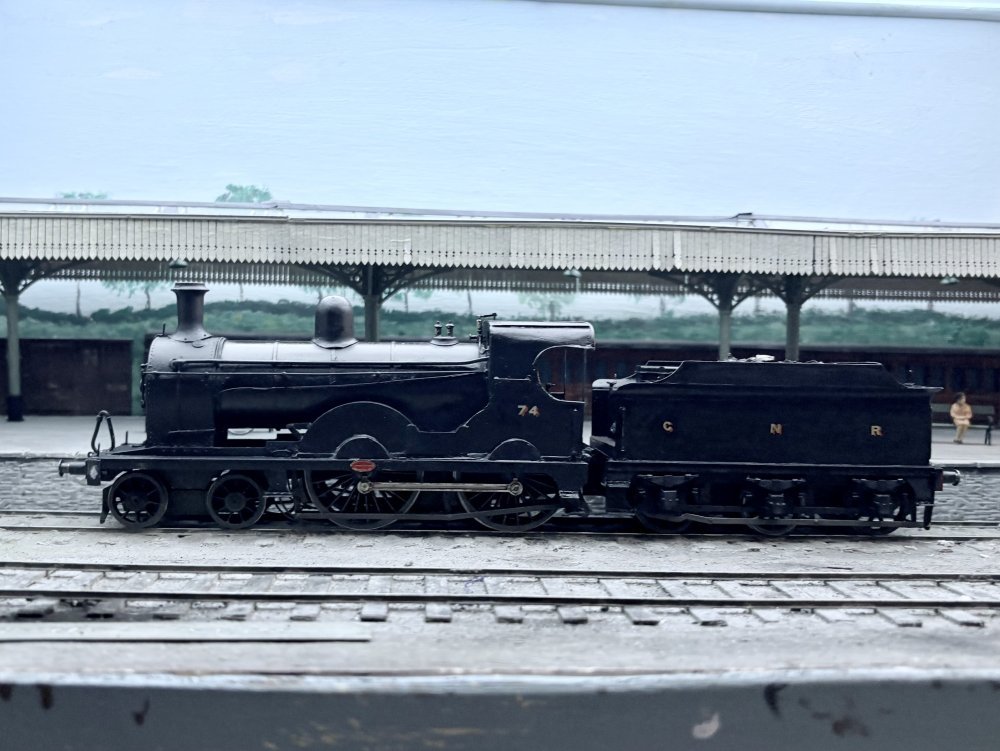-
Posts
4,643 -
Joined
-
Last visited
-
Days Won
59
Content Type
Profiles
Forums
Events
Gallery
Everything posted by Galteemore
-
And are in any case lacking the most distinctively Irish feature of all - 5’3” between the wheels!
-
I really don’t want to like this but can’t help myself. Until these things arrived I travelled to school on 70s and 80s under somersault signals. These carbuncles appeared and the world changed…..lovely model though !
-
-
The comments of Jim McGeown, who makes a similar range in 7mm, are always worth reading on this, emphasis mine: Although based on prototypes the concept of these coach kits is that they are very generic and represent typical coaches that were built by all the railway companies. These kits have been designed to provide the modeller with an economical coach that can be built in a reasonable weekend modeling session to a level of detail suitable for running on a layout. The modeller can then paint the coach in their chosen railways livery. By painting and lettering in say LNER brown livery a set of these coaches will capture the look and feel of a typical LNER rural branch line train made up of inherited pre grouping coaches. Your friends will probably make comments like "I see that you have modeled the coaches used on the Campbellwick Green branch in October 1936". You can then nod sagely and secretly smile to yourself knowing that the most distinguishing thing about coaches is their colour and lettering. Painted chocolate and cream they have the look of some of the South Wales railway companies coaches that were absorbed by the Great western and painted LMS maroon a Midland appearance and so on. The possibilities for these coaches is only limited by your imagination.
-
They are ‘generic’ coaches so not especially accurate to any company. However, they will make an extremely attractive consist and the quality finish will make them blend in with other Irish stock. Put it this way, they look more convincing than those old Lima Mk1s in orange and black …..
-
That’s terrific work. I can well imagine the hours of observation and planning that went in before any construction! Really pays off - lovely modelling of a place I know very well.
-

Ernies Massive Irish 1930's to 2005 Photo Archive
Galteemore replied to Glenderg's topic in Photos & Videos of the Prototype
Thanks Ernie - nice to see ‘normal’ traffic. So many Warrenpoint photos, naturally enough, show the place clogged with excursion traffic. -

British stuff from the Catacombs
Galteemore replied to jhb171achill's topic in British Outline Modelling
Indeed it is, ‘ E C Trench’, one of the ‘Patriots’. Amazingly, the first few were actually rebuilds of the Claughtons like ‘Baltic’ above, although not much of the original loco survived……hopefully the new build Patriot will be on the rails soon…. The lower loco is a Beames 0-8-4T - one of the final LNW designs before amalgamation. Beames was educated in Monkstown. -

Canarian Container Anorak
Galteemore replied to DJ Dangerous's topic in Photos & Videos of the Prototype
-
Here’s one idea. Get hold of an Alphagraphix 4mm scale GN standard pattern box. That will provide templates for lots of the detail parts you will need, and possibly help scale up parts such as windows for that particular cabin. Great drawing btw. The link is for an O gauge one but you’ll get the idea.https://www.ebay.co.uk/itm/Alphagraphix-A125-Great-northern-Railway-of-Ireland-signal-box/273994114694?hash=item3fcb526686:g:Pn8AAOSw9yZdb9ng this Jim O’Dea image might also help if not seen https://catalogue.nli.ie/Record/vtls000304361
-

2 Axle Beet wagon - Provincial Wagons - Bullied corrugated open wagon
Galteemore replied to Noel's topic in Irish Models
If ever there was a case for building a replica wagon for a museum, the Irish cattle wagon has to be up there. One railway company above all, of course…. -
We are very fortunate- it was built in one of the more enlightened epochs of museum architecture! The main Ulster Museum in central Belfast was extended in the late 60s and is an absolute carbuncle. The transport galleries are a great facility and a vast improvement on their predecessor, which has now reverted to its previous role as a factory! The hilly site is not ideal for a working railway, but a 3’ gauge line round the Folk Museum part would have been nice….. Safe travels, David.
-
Amazing how the addition of some bits of detail can really lift and transform a model. This was what so many skilled modellers had to do years ago with basic RTR products - nice to see the old ways on show here !
-

British stuff from the Catacombs
Galteemore replied to jhb171achill's topic in British Outline Modelling
Now that top one is especially nice. A large boilered Claughton - ‘Baltic’, at the end of her days I think - withdrawn in 1937. She looked gleaming in 1932….https://www.rail-online.co.uk/p302805879/hC5F5FA6A -

Wexford MRC CLG Exhibition April 30th/May 1st 2023
Galteemore replied to Irishrailwayman's topic in What's On?
Are there no scones south of the Slaney then ?- 49 replies
-
- 2
-

-
- model railway exhibition
- wexford mrc clg
-
(and 1 more)
Tagged with:
-
Great work. Very impressive little aircraft in real life too, very capable aerobatically. I was quite surprised to see what they can do!
-

British stuff from the Catacombs
Galteemore replied to jhb171achill's topic in British Outline Modelling
Looks like Crewe. Shed code is Crewe North. Wheel size suggests an LNWR 5’7 2-4-2T. Would have been nice had it been one of the similar 4’6 tanks which ended up on the DWWR! -

Ernies Massive Irish 1930's to 2005 Photo Archive
Galteemore replied to Glenderg's topic in Photos & Videos of the Prototype
Don’t have the Cassells book to hand but I suspect the Jeeps are stored and not withdrawn. This pic predates both the summer excursion season and of course the spoil work going at full blast, which effectively rescued the WTs from early oblivion (the oldest was only 18 years in ‘67). No Jeep was withdrawn until 1968, and at least one of the locos pictured was in service until 1970. The last three Jeeps were actually on NIR books until 1971 - 4, obviously enough, and 51/53. At the time this photo was taken in 67, some ex GN locos also remained on the books - including an SG3 and two UGs. -
Great work. Almost like a Belpaire boiler in front of the cab !
-
Not in traffic, as I understand from Blaine’s post above. The mortal remains of 191 lingered at Inchicore until disposed of in 1998, I think.
-
17 Aug 1991
-
Great work. Getting flashbacks to early 80s north Leitrim….
-

British stuff from the Catacombs
Galteemore replied to jhb171achill's topic in British Outline Modelling
Lake District? 11E is shed code for Tebay. No 70 was, I think, a long term resident. -
Glad that charity has somebody switched on doing their listings for them! It’s an English charity - local to me - so doubly impressive that they have got the description sorted, rather than some ‘model train coaches’…..
.png.c363cdf5c3fb7955cd92a55eb6dbbae0.png)








